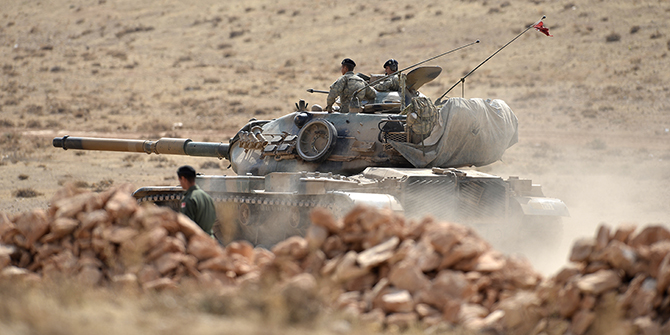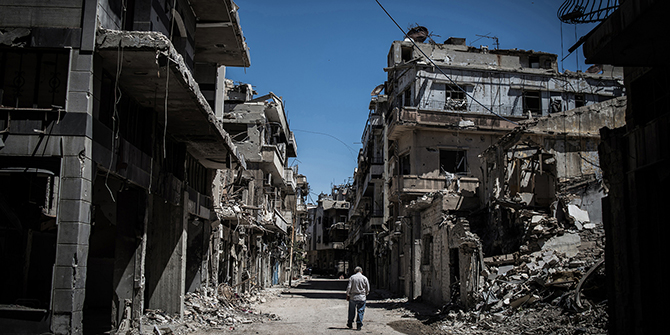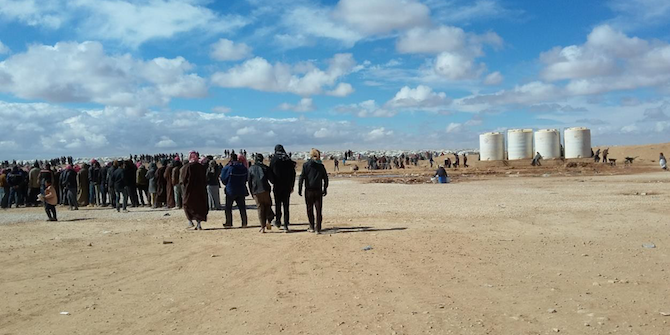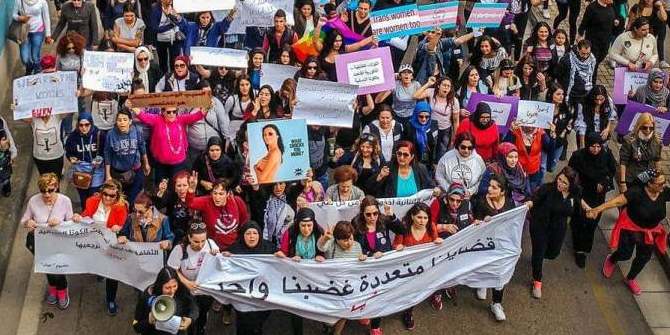by Zeynep Kaya
#Rojavaat4
This memo was presented at a workshop organised by the LSE Middle East Centre examining the experiment in Western Kurdistan. A report providing a distillation of the presentations and discussions is available to download here.

What is Turkey’s problem with Rojava?
Rojava poses a large and complicated challenge for Turkey. Turkey has a historical tradition of considering any Kurdish polity as threat. This policy has been mainly due to the fear that increased Kurdish political power in the region might affect its own Kurdish issue. This effect has been envisioned in mainly two ways: (1) an internationally recognised or de facto Kurdish autonomous region as a bordering neighbour could increase popular support for Kurdish rights and political mobilisation in Turkey; (2) political, economic or military relationships between a Kurdish entity and Kurdish political organisations in Turkey could strengthen the capacity and influence of the latter. Turkey’s concerns about a PKK-friendly autonomous region in Syria are very similar to its concerns over the emergence of an autonomous region in Iraq in the 1990s.
Turkey sees any political development in relation to Kurds in the context of its security threat perceptions. Security is defined in the Turkish state doctrine primarily in internal terms, the territorial unity of the Republic and the secular nature of the state. The PKK (Kurdistan Workers’ Party) and Kurdish nationalists elsewhere are seen to pose a challenge to the territorial unity of the Republic and should therefore be countered. Strong security responses to the PKK threat are ingrained in the long-term path along which the state has evolved. Robust security responses by successive governments, encouraged by the military, still determine state responses today.
The Turkish state’s conception of ‘terrorism’ leads Turkey to use its definition expansively towards organisations that appear to be connected to or friendly with the PKK. The primary legal framework defines terrorism as, ‘any act designed to violate territorial or national integrity, and any act designed to jeopardise the existence of the Republic of Turkey’. Separatist terrorist organisations, such as the PKK and TAK (Kurdistan Freedom Falcons) are at the top of the wanted list. Since the Turkish state’s definition of terrorism is directly linked to its national security framework, it sees any group affiliated to the PKK, such as the PYD, as inherently terrorist.
Although having a Kurdish neighbour will never be ideal for Turkey, the Kurdistan Region of Iraq has become a relatively more digestible option. This is because the dominant Kurdish party in Syria is linked to the PKK while the main Kurdish parties in Iraq are not.
Turkey’s policy towards Kurds in Syria is also more intrinsically connected to its domestic politics than was the case with the Kurds in Iraq. This is because of the deep cross-border political and social connections between the Kurds in Turkey and Syria, which are stronger than those between Kurds in Turkey and Iraq. Also, in the case of Syria, Turkey has no internationally recognised permission to carry out military action and surveillance in the areas across its border, whereas such permission has existed since early 1990s in Northern Iraq. Finally, the relationship between Rojava and the Syrian state has not been too hostile, whereas relations between the KRG (Kurdistan Regional Government) and Baghdad have. This is an important difference, as Turkey sees the Syrian regime as hostile, but did not perceive the Iraqi regime as such.
Turkish scenarios
Scenario 1: Invasion or military operation
When the autonomous Kurdish region emerged in Iraq after the Gulf War in the 1990s, Turkey carried out military operations in the no-fly zone against the PKK in Northern Iraq. These operations were not carried out against Iraqi Kurds and took place under an international agreement. In relation to Syria, Turkey called for the creation of a no-fly zone or buffer zone similar to the one in Iraq. However, this has not happened and there is no international legal framework for Turkey to undertake direct armed activities in Syria except as part of an anti-ISIS coalition. A direct invasion was very unlikely especially considering Turkey’s current domestic problems and the extremely uncertain and complicated war in Syria. However, this scenario has become more probable since the coup attempt in July 15. Since then, significant changes in Turkey’s foreign policy can be observed: Turkey–Russia tensions have deescalated, the Turkish Prime Minister Yıldırım announced their acceptance of Assad’s leadership during the transition period, and Turkey sent tanks, warplanes and special forces over the border.
Scenario 2: Crushing Rojava through destroying the PKK
This is the current long-term Turkish policy and is likely to continue along with more interventionist policies in Syria. However, even if Turkey makes short-term gains in achieving this aim, it is unlikely that Turkey will be able to ‘eliminate’ the PKK and the support for the movement in the country. Moreover, the fight with the PKK will further destabilise Turkey’s domestic politics and will make Turkey more vulnerable to internal and external security threats.
Scenario 3: Coming to terms with a Kurdish entity in Syria
This scenario is highly unlikely due to Turkey’s views explained above. Accepting Rojava would mean accepting the legitimacy of the PKK and its goals and ideologies. Another significant impediment to this is the Syrian regime’s alliance of convenience with the PYD.
Scenario 4: Turkey accepts an international peace deal on Syria that satisfies Syrian Kurds
Turkey’s refusal to consider the PYD as a legitimate partner is a major impediment to reaching a peace deal in Syria. Even if a peace conference takes place and reaches a deal despite this obstacle, Turkey would not recognise any decision that gives Syrian Kurds any form of autonomy. However, recent changes in Turkey’s foreign policy in the Middle East since mid-July 2016, as discussed above, indicate the possibility of Turkey to follow a less obstructive attitude towards achieving a peace deal, particularly with respect to Assad’s position. However, Turkey is likely to continue to barricade PYD’s involvement in such a deal by trying to detach PYD and its international allies, such as the US.
Zeynep Kaya is Research Fellow at the LSE Middle East Centre and Research Officer at the LSE Centre for Women, Peace and Security. Her research interests include gender, displacement and conflict/post-conflict processes in the Middle East and the implementation of the WPS agenda in Iraq and Iraqi Kurdistan. She is currently working on her book titled Mapping Kurdistan: Self-determination, Territoriality and Quest for Statehood. She tweets at @zeynepn_kaya.
Other Contributions
- Dissecting the YPG: Operations and Strategies as the Defender of Rojava
by Wladimir van Wilgenburg
- The Importance of Rojava–North Syria for the PKK
Cengiz Gunes
- Are the old Syrian Kurdish parties relevant anymore?
Harriet Allsopp






